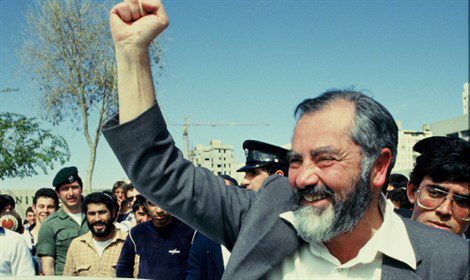Confused Jews
by Rabbi Meir Kahane – first published in 1973.
It is recorded in the Megilla:
“The couriers went forth hurriedly by order of the king, and the decree was given in Shushan, the capital. And the king and Haman sat down to drink; and the city of Shushan was confused” (Megillat Esther 3:15).
“And Mordechai perceived all that was done, and Mordechai tore his garments, and dressed himself in sackcloth with ashes. He went out into the midst of the city, and cried out with a loud and bitter cry” (ibid, 4:1).
It appears to me that this is both a difficult and wondrous lesson. It also holds an incredible truth and insight that we would do well to learn, understand and act upon.
What is happening here? Haman has just emerged triumphant from his efforts to win approval for genocide against the Jews. The king has agreed; has removed his ring and given it to Haman; Haman has chosen a day for the Final Solution and the messengers go off “hurriedly by order of the king.” “The decree was given in Shushan” and, presumably, the whole Jewish population — metropolitan and sophisticated, knows of the electrifying news. What is their reaction? “And the city of Shushan was CONFUSED.”
Confused? What an incredible reaction! Say terrified, fearful, broken — but “confused”? What is there to be confused about? It is clear what is happening; there is a decree to exterminate the Jews! What place is there for confusion? More. We have just learned that the decree is given in the entire city of Shushan, and that the Jews of the city are confused upon hearing it. Everyone knows; everyone is “confused.” What in the world, then, is the meaning of the next verse, “and Mordechai perceived all that was done.” Certainly, Mordechai knew, but not just Mordechai. Everyone knew, so what is the purpose of singling out Mordechai as if he had some special knowledge? More, one may ask, given the general knowledge, why was it that only Mordechai reacted with mourning, sackcloth and ashes while all the rest limited themselves to “confusion”?
Listen carefully to Biblical insight; its lesson could well be our own salvation. What is Shushan? The sophisticated, modern capital of the Persian empire. The largest, most exciting and most cosmopolitan city of its time. (Say, Berlin 1928 or New York City 1973.) The Jews, more sophisticated and more cosmopolitan than everyone else, clever and eager to climb, are ready to cast off their Judaism at the drop of an emancipated opportunity. The king invites them to his banquet? They flock there against the protests of Mordechai, and sup happily from non-kosher food served temptingly on Persian dishes.
What joy reigns at the banquet and at all the other banquets, not so much for the food and the entertainment, but because here is proof absolute that the Jew has been accepted in Persia by the progressive, sophisticated and enlightened Persian. He can assimilate calmly and without fear. Farewell to insecurity and the need to contemplate returning to Zion where the living is so not-easy and hardships abound. Farewell to the concept of Exile. We are now home; Shushan is our Jerusalem (as in later years, the descendants of these Jews would joyfully substitute “Hamburg” or “Vienna” or “Charleston, South Carolina”). We are Persians of the Mosaic persuasion. Joy and tranquility reign among the Persian Jews, and assimilation amongst their fellow equal citizens goes on at a mad pace.
And suddenly, the shock bursts upon them like a bolt from above! A decree from the king that his Persians of the Mosaic persuasion be exterminated! Not some, but all! Not just the reactionary and medieval ones with the kaftans and earlocks and infuriating habit of tradition who live in the squalid part of Shushan known as Williamshan, but even the intellectual and the radical on the Upper East Shan of the city. My L-rd, what is happening? What has happened to all the emancipation and liberation and equality and dreams of integration? Gone up before the mocking words of Haman, “there is a certain people scattered abroad and dispersed among the people in all the provinces of your kingdom . . .” (Esther 3:8). The poor modern, sophisticated and assimilated Jews of Shushan sit stunned. They cannot believe their ears. It is not fear or panic that is their initial reaction but exactly — “confusion.”
It cannot be happening to us. We are not Jews, we are Persians. Our world cannot be turned upside down overnight and our illusions so burst. All that we believed in cannot be completely wrong! “Confusion,” that is the precise word. So, of course, they knew — as did Mordechai. But his “knowing” was of quite a different kind. He knew, and he understood, not with confusion — BECAUSE HE NEVER ALLOWED HIMSELF TO BELIEVE THAT THE JEW IN THE EXILE COULD EVER FIND A PERMANENT HOME. Mordechai is the Jew of honest tradition who knows that there is only one home — the Land of Israel — and that all the rest, the most progressive and the most enlightened nations, in the end, turn upon the Jew and demand his head. He hears the news and he is not “confused”; he is not startled into paralysis. He knows that this is possible and, now that it has come, he acts and cries out: Jews, repent! Pray unto G-d! Learn the bitter lesson of Exile!
Jews of Shushan, 1973. Leave off confusion. Go home!
[And so too today. Jews of Shushan 2024. Leave off confusion. Go home!]






